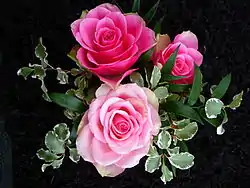roze
Dutch
Alternative forms
- (obsolete) rose
Etymology
From Middle Dutch rose, from Middle French rose.
Pronunciation
- IPA(key): /rɔːzə/
- IPA(key): /rɔːs/
audio (file)
Inflection
| Inflection of roze | ||||
|---|---|---|---|---|
| uninflected | roze | |||
| inflected | roze | |||
| comparative | rozer | |||
| positive | comparative | superlative | ||
| predicative/adverbial | roze | rozer | het rozest het rozeste | |
| indefinite | m./f. sing. | roze | rozere | rozeste |
| n. sing. | roze | rozer | rozeste | |
| plural | roze | rozere | rozeste | |
| definite | roze | rozere | rozeste | |
| partitive | rozes | rozers | — | |
Derived terms
- roze kaketoe
- roze spreeuw
Descendants
- → Caribbean Javanese: ros
See also
| wit | grijs | zwart |
| rood; karmijnrood | oranje; bruin | geel; roomwit |
| groengeel/limoengroen | groen | |
| blauwgroen/cyaan; groenblauw/petrolblauw | azuurblauw | blauw |
| violet; indigo | magenta; paars | roze |
Latvian

Rozes
Etymology
Borrowed from Middle Low German rōse, or from Middle Dutch rōse (compare German Rose), themselves borrowings from Latin rosa. The word was also apparently borrowed into Latin (via Ancient Greek) from Old Persian. In Latvian texts this word is first mentioned in the 16th century, apparently as a general word for “(garden) flower” or “(bright-colored) flower” — as a synonym of puķe (“flower”), a sense still found in folk songs. The meaning was restricted to “rose” only in the 17th century. The sense “erysipelas” was first attested in the 18th century.[1]
Pronunciation
- IPA(key): [rūōzɛ]
Noun
roze f (5th declension)
- rose (decorative shrub, gen. Rosa, with beautiful flowers and thorny stems)
- mīkstā roze ― soft rose
- pelēkzilā roze ― gray-blue rose
- audzēt rozes ― to grow roses
- rožu dārzs ― rose garden
- rožu eļļa ― rose oil
- rose (a flower from this shrub)
- balta, sārta, dzeltena roze ― white, pink, yellow rose
- 'pasniegt rozes ― to offer, give roses
- rožu pušķis ― a rose bouquet
- erysipelas (severe skin disease caused by streptococcus infection)
- rozi izraisa strutas radošās baktērijas, visbiežāk streptokoki ― erysipela is caused by pus-generating bacteria, usually streptococci
Declension
Declension of roze (5th declension)
References
- Karulis, Konstantīns (1992), “roze”, in Latviešu Etimoloģijas Vārdnīca (in Latvian), Rīga: AVOTS, →ISBN
Romanian
Adjective
roze m or f or n (masculine plural rozi, feminine and neuter plural roze)
Declension
This article is issued from Wiktionary. The text is licensed under Creative Commons - Attribution - Sharealike. Additional terms may apply for the media files.